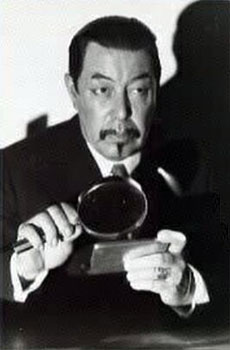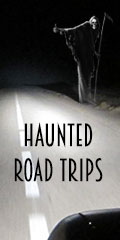
 Charlie Chan
Charlie ChanOne of the world's most intriguing detectives, Charlie Chan, was the enigmatic creation of Earl Derr Biggers. Author, Biggers, had traveled to Hawaii and heard tales of a Chinese detective who possessed an extraordinary knack for solving difficult cases. Intrigued, Biggers created Charlie Chan.
Chan's first appearance was in Biggers' 1925 book, House Without A Key, which was published in installments in the Saturday Evening Post magazine. As a valued member of the Honolulu Police Department, Chan seemingly spent little time tracking down murders under the swaying palm trees of Honolulu. In fact, in the many adventure/crime novels that followed, Chan traveled around the globe catching murderers and becoming a noted celebrity within the smart circles he seemed to easily inhabit. Five more books soon followed: The Chinese Parrot (1926), Behind The Curtain (1928), The Black Camel (1929), Charlie Chan Carries On (1930), and Keeper Of The Keys (1932).All of these novels were transformed into film as cinema fans quickly took to Chan's unique style of detection. The exception was Keeper Of The Keys, which was produced as a Broadway play in 1933.
Fans of the Chan novels were delighted by the appearance of their favorite detective in movies. House Without A Key was released by Pathe in 1926. The Chinese Parrot was released the same year by Universal, followed by Fox. Behind That Curtain in 1929. The Chan movies drew their biggest audiences from 1931 to the mid 1940's. Despite having a succession of actors cast in the role of Chan, film fans couldn't seem to get enough of the wise Chinese detective. Fox produced at least one new Chan film each year with Warner Oland appearing in the starring role from 1931 until 1938. Sidney Toler took over as Chan in 1938 and continued making up to 3 Chan movies a year until 1947. Roland Winters continued as Chan in 1947 and made five more pictures for Monogram.
Warner Oland, a native of Sweden, was almost as enigmatic a man as the rotund Chinese detective he was destined to play on film. An intellectual giant, Oland was fluent in several languages, and studied art, music and philosophy. He began his career in theater as a set designer but found plenty of work in early films playing villains. His work as a character actor was so believable, that Fox felt he could be convincing as an Oriental in the Chan series. Of course, the idea of casting a non-Asian in the role of Chan is very politically incorrect today, but Oland managed to pull off the job remarkably well. Despite the success he found as Charlie Chan, Oland struggled with personal issues including alcoholism and a troubled marriage. In 1937, he simply walked off the movie set and sailed to Europe. He succumbed to pneumonia in Sweden the following year.
Sidney Toler had been a busy working actor on Broadway and in films when he was asked by Fox to take over the role of Chan when Oland walked out of the series. The studio paired Toler with Chinese actor, Victor Sen Yung (as the #2 son) and soon put Charlie Chan In Honolulu into production. Fans readily accepted Toler as Chan and he continued making films until 1947 when he was stricken with cancer and passed away.
Veteran actor, Roland Winters, played Chan in the final heyday of the Chan films. Winters was a successful Broadway actor and made many appearances on radio. He made six Chan films for Monogram Pictures, the last being The Sky Dragon.
Of course, fans of the Charlie Chan series enjoy the performances of the many supportive actors whose work added humor to balance the horror of crime. Keye Luke was cast as Charlie's No. 1 son, Lee Chan, in Charlie Chan In Paris in 1935. A native of China, Keye Luke is perhaps best known for his memorable work on the Kung Fu television series. Victor Sen Yung was cast as Jimmy Chan, the No. 2 son of the detective in Charlie Chan In Hollywood. Yung would go on to gain fame on the 'small screen' when he played "Hop Sing" on the long running TV show, Bonanza. Another fine Asian actor, Benson Fong, appeared in several Chan movies as the No. 3 son, Tommy Chan. It is interesting to note, however, that each of these actors popped up in different Chan films...with different actors playing their father. Continuity was not, obviously, a key factor in the amazing success of these movies.
African American actor, Mantan Moreland, was another popular character actor who found fame in the Chan series. Mantan's comic portrayal of Birmingham Brown, Charlie's loyal but timid employee, added comic relief in many of the Chan movies. A master of comic timing and a slow double take, Mantan Moreland, brought smiles to generations of Chan fans. Today, there is some controversy as to the casting of African Americans in roles where they might be used as pawns for misguided segregationist views. While it is true, and very unfortunate, that few African American actors were cast in serious roles which could showcase the depth of their art and talent, it nonetheless, does not diminish the genuine comic abilities of an actor as talented as Mantan Moreland. Given the time he lived in, he turned out superb performances which opened the doors for minority actors who were to follow him in the decades to come.
Read our review of Charlie Chan in London








